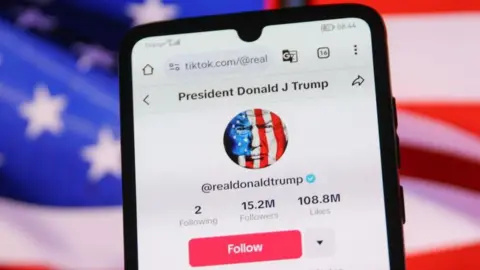In a significant turn of events regarding the popular social media platform TikTok, former US President Donald Trump has suggested that he might consider lowering tariffs on China to facilitate the sale of the video-sharing app from its parent company, ByteDance. This statement, made during a press conference, indicates a willingness to maneuver economically in order to secure a deal that has become a focal point of international negotiations.
Trump emphasized the necessity for China to grant approval as a crucial element in the deal process. In his remarks to the press, Trump mentioned, “With respect to TikTok, and China is going to have to play a role in that, possibly in the form of an approval.” His comments underline the complicated geopolitical dimensions of the situation, which has always been intertwined with economic interests and national security concerns. The former president hinted at the possibility of giving a “little reduction in tariffs or something to get it done,” suggesting that his administration might leverage tariff adjustments as part of the negotiations surrounding TikTok’s fate.
Beyond tariffs, another significant development is the extension of the deadline for negotiating a sale. Trump indicated that he may be willing to prolong the deadline set for April 5, which would allow potential buyers, who are not based in China, additional time to work out the complexities involved in the acquisition process. This is particularly pertinent as TikTok, a platform that has amassed around 170 million users in the United States, faces pressure from the US government related to national security risks and concerns over data privacy.
In January, the former president had previously delayed enforcing a law enacted under the Biden administration that aimed to ban TikTok entirely. This law, passed in early 2024, was framed as a national security measure, reflecting the ongoing anxiety over Chinese ownership of platforms that collect extensive user data. Trump’s ongoing involvement with TikTok has now taken a more personal turn, as he himself operates an account on the app, boasting over 15 million followers and having garnered billions of views during his presidential campaign.
However, the TikTok negotiations are not without their hurdles. A significant sticking point remains securing the agreement of the Chinese government, which has historically been protective over technology and data matters. Trump has approached negotiations with a straightforward strategy: on his first day back in the White House on January 20, he threatened to impose additional import tariffs if Beijing did not agree to facilitate a TikTok sale.
There have also been broader tariff implications in the relationship between the US and China. Just this month, the Biden administration raised tariffs on imports from China to 20%, escalating the existing duties imposed by Trump earlier in February. In retaliation, China enacted its own tariffs, including new taxes on American agricultural products, illustrating the tit-for-tat nature of trade relations between the two nations.
In the context of ongoing talks, China’s government has expressed interest in engaging in dialogue with the US to resolve these issues. The recent tension underscores the increasingly multifaceted and fraught nature of international trade and technology negotiations, wherein economic interests intersect with national security and foreign policy.
The situation surrounding TikTok reflects the complex interplay of commerce, technology, and geopolitics. It remains uncertain how negotiations will unfold as both nations navigate their economic landscapes, with decisions made in the coming weeks potentially reshaping the platforms available to American consumers and the broader tech landscape. Whether tariffs will indeed be reduced or extended deadlines will yield a successful sale remains to be seen, but the stakes are undoubtedly high as both Trump and the Biden administration tread cautiously in their dealings with an essential player in the global digital economy.



